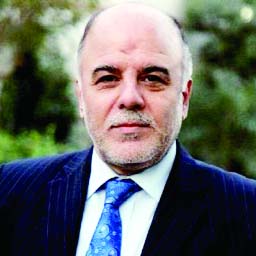
Reuters, Baghdad :Iraq’s president named a new prime minister to end Nuri al-Maliki’s eight-year rule on Monday, but the veteran leader refused to go after deploying militias and special forces on the streets, creating a dangerous political showdown in Baghdad.Washington, which helped install Maliki following its 2003 invasion that toppled Saddam Hussein, congratulated Haidar al-Abadi, a former Maliki lieutenant who was named by President Fouad Masoum to replace him.Maliki said in a televised speech the president’s decision to name a replacement for him was a “dangerous violation” of the constitution and, flanked by political allies, he vowed “we will fix the mistake.”Maliki’s son-in-law, Hussein al-Maliki, called the move “illegal” and said it would be overturned in court. “We will not stay silent,” he said.Washington delivered a stern warning to Maliki not to “stir the waters” by using force to cling to power.A Shi’ite Muslim Islamist, Maliki is blamed by his erstwhile allies in Washington and Tehran for driving the alienated Sunni minority into a revolt that threatens to destroy the country. Leaders of Iraq’s Sunni and Kurdish communities have demanded he go, and many fellow Shi’ites have turned against him.US President Barack Obama said the naming of a new prime minister was an important stride for Iraq toward rebuffing Islamic State militants, who have overrun large swathes of northern Iraq.Obama said he spoke with Abadi to congratulate him and to urge him to quickly form a new cabinet that is broadly representative of Iraq’s different ethnic and religious communities.UN Secretary-General Ban Ki-moon also praised the naming of Abadi and urged him to seek a broad-based government acceptable to all components of Iraqi society, the United Nations said.The new political crisis comes just days after Washington launched its first military action in Iraq since pulling its troops out in 2011. US warplanes have bombed Sunni insurgents from the Islamic State, who have marched through northern and western Iraq since June.Washington says it is taking limited action to protect a Kurdish autonomous region and prevent what Obama called a potential “genocide” of religious minorities targeted by the militants.The Pentagon said US airstrikes conducted since Friday have slowed the operational tempo of the Islamic State but are unlikely to substantially weaken the group.US aircraft on Monday hit four Islamic State checkpoints and destroyed several of the group’s vehicles near Mount Sinjar, where thousands of people of the Yazidi religious sect have taken refuge, the Pentagon said.Washington is also directly supplying weapons to Kurdish fighters, US officials said. The weapons were supplied by the Central Intelligence Agency but the Pentagon may soon start arming the Kurds, the officials said. They declined to specify when the supply program began or what sort of arms it included. Islamic State fighters made new gains against Kurdish forces despite four days of US airstrikes, while Baghdad, long braced for the Sunni fighters to attack, was now tensing for possible clashes between Maliki and rivals within the Shi’ite majority.President Masoum asked Abadi to form a government that could win the support of all groups in a parliament elected in April. In remarks broadcast on television, Masoum, a Kurd, urged Abadi to “form a broader-based government” over the next month. Abadi urged national unity against the “barbaric” Islamic State, which has driven tens of thousands from their homes as it swept aside Baghdad’s troops to consolidate a “caliphate” in Iraq and Syria.”We all have to cooperate to stand against this terrorist campaign launched on Iraq and to stop all terrorist groups,” he said in broadcast remarks after meeting Masoum.As police and elite armed units, many equipped and trained by the United States, locked down the capital’s streets, US Secretary of State John Kerry aimed a stark warning at Maliki against fighting to hold on to power.”There should be no use of force, no introduction of troops or militias in this moment of democracy for Iraq,” Kerry said. “The government formation process is critical in terms of sustaining stability and calm in Iraq and our hope is that Mr. Maliki will not stir those waters.”There will be little international support of any kind whatsoever for anything that deviates from the legitimate constitution process that is in place

